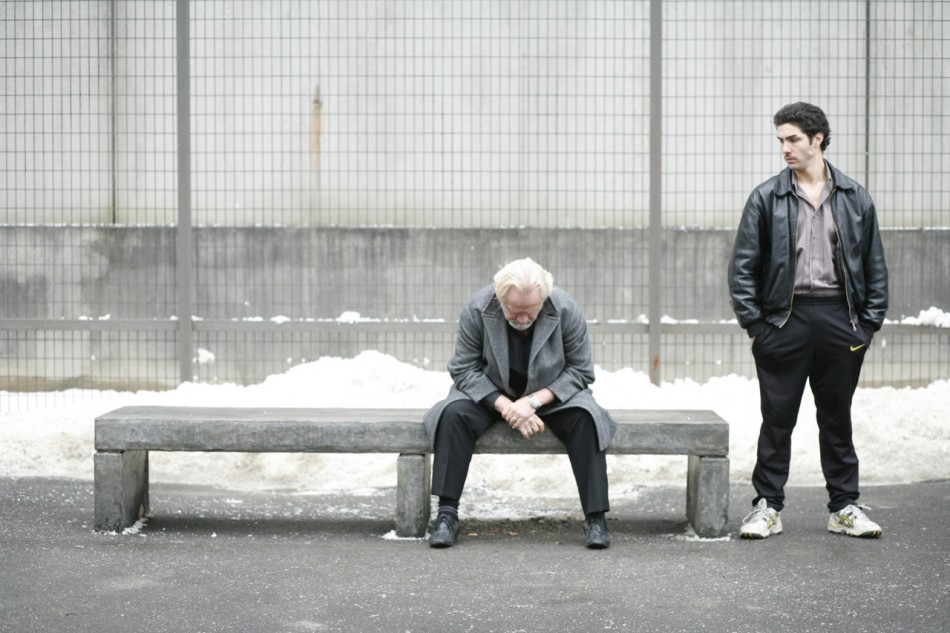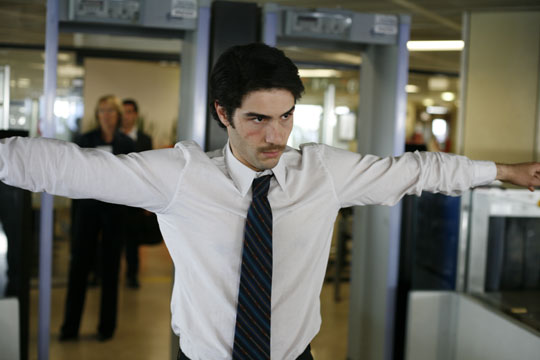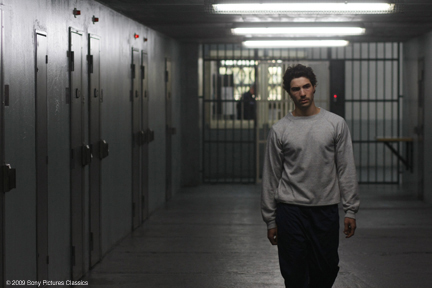
Niels Arestrup and Tahir Rahim in "The Prophet"
Film Review: A Prophet
A Prophet is the prison drama that won Cannes and was the French contender to win an Oscar for foreign language film (the Argentinian movie El Secreto de Sus Ojos won) .
What we call prison movies are really mostly gangster movies in which the gangsters are out of prison running amok (Goodfellas, Godfather, King of New York). So 120-plus minutes of banishment upon islands of men is a picture rarely imagined much less prolonged on the big screen. The prison in A Prophet is both spectacularly unfamiliar and gravely compelling. Run by a Corsican gang, shared by devout Muslims and other secular survivors who each chalk small(er) power centers in the yard, prison is a place of exposure and protection. Exposure can be fatal. Protection demands favors.

Tahir Rahim in "A Prophet"
Director Jacques Audiard (who has been screenwriter on many previous films including Baxter (1989)) created this universe in 16 weeks he has said was really tough because it required him to avoid research in real prisons lest he fall into documentary vein. Meantime the tautness of the story made for verite greater than verisimilitude.
If you think back to “prison” films, Papillon (1973) dramatized a bestselling book of a true story of a two-time prison break. In the Bridge on the River Kwai (57) the imprisoning colonizer was still at war: the Japanese enslaving their British war prisoners. Buddies in those movies never literally got into bed together. So “prison,” historically in movies, means anything from that place that gangsters try to avoid, to chains which must be broken for cultural-historical good to triumph. In the gangster movie the sink is behavioral rather than a literal confinement.
So, making the sink literal makes A Prophet revolutionary, in that it seizes the taboo and thus intimacy of the turf. It also does a literary French thing and suggests, at the start, a tenderness that can incite a latent nationalist loyalty as well as feelings that verge into the mystic. Indelibly, being French, this theme goes too to the possibility of what writer Jean Genet considered, in Miracle of the Rose, a potential male to male Romeo and Juliet in the joint.

Tahir Rahim in "A Prophet"
Malik El Djebena (Tahar Rahim) an Arab and a Corsican, enters prison for a 6-year sentence, at 19. Nineteen is older than the age Genet described as “too hard” in the potentialized prison ecstasy. Ecstasy this is not. Malik cant get out of himself, but which side actually, self, or other, entraps him? This becomes problematic right away, as Malik identified for his Corsican side is told by the Corsican mob to gain access to an Arab who has come on to him in the showers. Maliks character expresses with furtive pacings and hair-combings an I-cant-believe-this-shit . Can he do what he must to survive? Then what? Then: vision. The seer turns prophet. And sees ambition he hardly knew to expect.

A Prophet
The Corsican prison jefe is Cesar Luciani, Niels Arestrup, a Dane who speaks perfect French and does an incredible job expressing with quick moves and downcast eyes the brute force of the films stolid progression from inside to out and inevitably back in. His forbearance sitting on the bench in the yard surrounded by rough trade suggests a stage actors modulation of face and surprise gesture. The intense cinematography keeps you seeing the prison effectively as stages, cubes that interlock unexpectedly in the cells, the yard, the shower, all places where men are boxed in. The kindness of the troubadour who looks back at Malik, whom Malik keeps looking back at, is the intense double of such films that take “prison” drama into much more complex symbol than gangster flick construes. No sentimentalizing affects the power of this film about how a young delinquent learns to experience corruption as a force of visionary power. See this movie.
One thing we can say with certainty we dont understand is male on male relations in other cultures, whether those be the omerta code of Corsica or networks of couriers and distant relations arbited by elders in spots like Tangiers or Gaza. Gaza as possibly the most unstable border of the world is the precinct of Ajami, the other Academy Award foreign film nominee with Arab characters and subject matter — this one made in Israel. The Israeli view is of Gaza in which a very circular and running-backward stories includes naturalized Israelis and illegal workers from Palestine and the army-checkpoint corpus whose identities are as nebulous and possibly perilous as the border.
I saw Ajami in New York and when I called David to ask his opinion he called it an Israeli Mean Streets.
In a way. A factor of haplessness applies. Even to the point that you could also think about Spike Lees Do the Right Thing. But here the explosion is not storefronts crashing in as what is called “random” between Muslims, Christians and Jews in Israel, the round-the-corner element of inescapable brutality.
In considering the subtlety of the colonizer in these two movies I went back to look at the Bridge on the River Kwai trailer. It has in post World War II melodrama Bill Holden shouting at Jack Hawkins not to be “crazy with courage. For what?” he asks.
“For what?” The line applies to Ajami though the answer might be only: For hatred.
